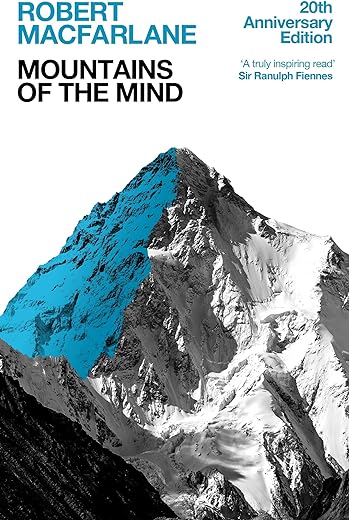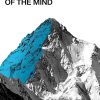Mountains Of The Mind: A History Of A Fascination
£8.70£9.50 (-8%)
‘The most exhilarating history of mountaineering … a riveting read’ Jeremy Paxman
‘A truly inspiring read’ Sir Ranulph Fiennes
‘It simply fizzes with insights into the sublime madness of mountaineering’ Roger Deakin
Once we thought monsters lived there. In the Enlightenment we scaled them to commune with the sublime. Soon, we were racing to conquer their summits in the name of national pride.
In this ground-breaking, classic work, Robert Macfarlane takes us up into the mountains: to experience their shattering beauty, the fear and risk of adventure, and to explore the strange impulses that have for centuries lead us to the world’s highest places.
WINNER OF THE GUARDIAN FIRST BOOK AWARD
Read more
Additional information
| Publisher | Granta Books (4 May 2023) |
|---|---|
| Language | English |
| ISBN-10 | 1783786795 |
| ISBN-13 | 978-1783786794 |
| Dimensions | 12.9 x 1.9 x 19.8 cm |




by Guy
First thing to say is that this book is billed as a ‘history of mountaineering’ in some of the spiel on the cover, which is totally misleading. It would be much more accurate to call it a cultural history of the role of mountains and mountaineering in Western Europe, and even that description wouldn’t really inform anyone about the sort of thing to expect.
The book ranges from scholarly examinations of how various literary luminaries reacted to and thought about mountains, to geology and natural history, to highly personal accounts of expeditions McFarlane has taken part in, interwoven with some thrilling tales of first ascents, desperate rescues, and the like. As a whole, it does hold together well, and some of the source material he uses from past writers is really interesting. McFarlane’s literary background shines through as he elucidates on Shelley, Coleridge, Byron, and Goethe’s responses to the Alps, as well as more expected Naturalists and travellers’ accounts, before a final lengthy chapter where he recounts George Mallory’s doomed attempts on Everest in the 1920s in the light of what he’s already explained about mountains in the Western imagination.
If you’re looking for a book about mountaineering, or some thrilling tales of derring do, there are better books than this. If you’ve already read a lot of those, though, and you want a more thoughtful book which really wrestles with the questions of what is so special about mountains and why are people driven to risk their lives climbing them, then this is a unique and fascinating read. I’m probably being harsh giving 4 rather than 5 stars, but I felt, if anything, that some sections felt a little light and the writer would have benefited from a bit more length to really build on some points. I’d have gladly have read another hundred pages.
by Paola Hanna
Absolutely brilliant. I am left breathless and stunned by the beauty of this book, and by the determination and heroism portrayed in it.
by Podiceps cristatus
Well, having finally got round to reading Mountains of the Mind, I wasn’t left disappointed and never have been by any of Robert Macfarlane’s works. This one is written in typical Macfarlane style. The sub title of the book is ‘A History of a Fascination’ and that is very much what it is, a history of humankind’s fascination with mountainous areas. It is of course much more than a history, containing many interesting facts about individuals and their idiosyncratic behaviors adventures and discoveries, geological interest and information about the author’s own treks into the mountains. The prose is wonderful and especially so when describing wilderness and mountainous areas. The chapter concerning George Mallory’s failed attempts on Everest is especially good and brings the book to a fascinating climax. The reader can decide if Mallory was a selfish adventurer or as legend has it, a heroic explorer.
Although I have always enjoyed fell walking I am no mountaineer, and I tend to frown upon some of the risk takers, but I did find that this book helped me understand better why so many are tempted to the heights. Great read, and I look forward to receiving Robert Macfarlane’s next book, out soon.
by Mr C Sawyer
Not entirely what I was expecting (my ignorance) but an enlightening and enriching view nonetheless – interesting to see the clear line to the original discovery of the mountains with how we / I perceive them now.
The only sad note was the Everest chapter – which I felt concluded falsely without the author exploring how he felt about Mallory and what became him. Anybody with an adventurous spirit can’t help but share a note of sympathy, and perhaps scary acknowledgement of what they might do in similar circumstances.
Still – well worth going on the list.
by A. G. Young
In Macfarlane’s Mountains of the Mind, he sets out to explain what drives people to the mountains in their droves, and especially what drives those who are prepared to risk their lives in pursuit of a particular summit.
The premise of this book is, potentially, a difficult one. It’s one thing to be a lover of the mountains and just ‘get’ what it’s like being amongst the peaks, but it’s entirely another to try to explain that over the full length of a book. Hence the mix of climbing history, geology, personal memoir and religion which makes up ‘Mountains of the Mind’, subtitled ‘A History of a Fascination’.
I must admit that when I bought this book I missed the subtitle*, so I probably went into this read on the wrong foot. I was expecting (and looking for) a travelogue that would sweep me back up amongst the mountain peaks in this tiresome year of non-travel, but if I’d read the full title properly I’d have realised that this is more of a history of mountain attraction. Some of the history had me riveted (for example the chapter on Mallory’s fatal attraction to Everest), but in other places I feel he got too caught up in trying to give a fully comprehensive chronological account of British climbing development. In my mind that’s a different book, and I would have loved if he’d spent a little less time back in the 1700s and focused more on modern climbing. For example, what drives 20,000 people – many of them inexperienced tourists – to climb Mont Blanc every year, despite helicopters lifting on average a body a day from the peaks above Chamonix in climbing season?
That said, Macfarlane is both an explorer himself and a talented wielder of the pen, and overall I really enjoyed this book. When he wasn’t bogged down in the extensiveness of his own research, Macfarlane’s knowledge and passion for the mountains is translated into wonderful writing that brings you shivering to the edge of many a snowy precipice. His own climbing adventures were fascinating – in fact, I’d have loved to have seen more of those memoirs in place of some of the historical detail.
Despite my niggles (and again, my fault for going in with the wrong expectation), this book did teleport me back to the mountains for a few days, and has left me with a hunger for some further mountain reading.
* In my defence this book seems to have a number of editions, many of which have ‘adventures in reaching the summit’ as the subtitle, which is closer to what I was expecting.